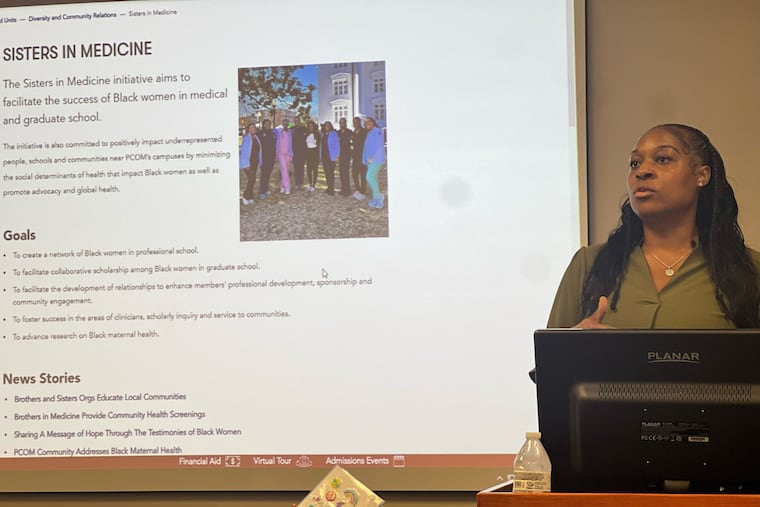The Black women of Sisters in Medicine are helping one another make it in health care
The PCOM-based group is modeled after Sisters in Medicine chapters at PCOM’s other campuses.

When Kayla Davenport, a third-year medical student at the Philadelphia College of Osteopathic Medicine (PCOM), tells people that she grew up in the foster care system, they’re often surprised.
“They’re very shocked because of how successful I am. I don’t really consider myself that [yet]. But I feel like I’m very driven and motivated to get to the top however I need to,” the Doctors of Osteopathic Medicine Class of 2025 chair said.
Davenport realized she wanted to become a doctor when she was in high school, after doing volunteer work with patients near her North Jersey home. But she was short on guidance; she didn’t have any doctors in her family, and didn’t have mentors to show her how to make it through the highly competitive field.
Her adoptive father took charge, making sure that she felt supported. “He would do the research for me, find the resources and send them to me, which got me here today,” she said. “I just started to realize how lucky I was … not everyone has that, and I don’t think it’d be fair for people that have these aspirations to be held back because they have limited [support].”
Now, she wants to be that same resource for other Black women who want to work in medicine. Davenport is one of the founding members of Sisters in Medicine at PCOM, a group meant to support the next generation of Black women in medical and graduate school. The group officially launched earlier this month, modeling itself after other Sisters in Medicine chapters based at PCOM’s two campuses in Georgia.
“A sense of community has been monumental to my ability to progress to where I am.”
“Being a minority sometimes can present many challenges navigating through the curriculum and different career milestones,” said Ashley Poole, an assistant professor in clinical psychology at PCOM, and a faculty adviser to the Philadelphia Sisters in Medicine chapter. Her goal is to have 50 women participate in the group over its first year.
“The hope is that Sisters in Medicine will create a network and an opportunity to connect [with] other women that may have similar experiences … [and] to work collaboratively to uplift and support each other,” she said.
Poole graduated from PCOM in 2020, but had attended an HBCU before she arrived on campus. She wasn’t sure what her experience would be like at a predominantly white institution, and made the effort to connect with Black mentors and student groups. Luckily, she found the right supports that helped her succeed, and now she wants to make sure that others like her have the same guidance.
“Community is so important. I have served on committees where we’ve looked at [students] that have not been so successful. … The common thing that I’ve seen is individuals that try to do it alone,” she said. “A sense of community has been monumental to my ability to progress to where I am.”
It would be easy for Black women in medicine to feel lonely. They make up fewer than 3% of all physicians in the United States today, according to census data. It’s part of the reason why the theme for Sisters in Medicine’s meetings and discussions this year will be mental health.
“When it comes to mental health, you tend to see Black women in that demographic of individuals experiencing a lot of challenges and often not seeking that help,” Poole said. “Health care is a field where providers tend to experience high burnout.”
“I really enjoy being able to see other people that look like me,” said Amber Davis, a second-year medical student at PCOM who is excited to get closer with other Black women on campus and learn from more experienced mentors as she pursues a career in pediatrics. “Sisters in Medicine is giving me that opportunity to lean on [them] and be able to know that I have the support to continue my journey.”
Davis is looking forward to connecting with local community members, too. Sisters in Medicine plans to share its mental health resources and practices with Black communities outside of PCOM.
“I want the community to know that there are Black doctors that are here to advocate for them,” she said. “It’s really important for us to be able to go out there and break the stigmas about mental health in the Black community and be able to get out resources for people who don’t know what they don’t know.”